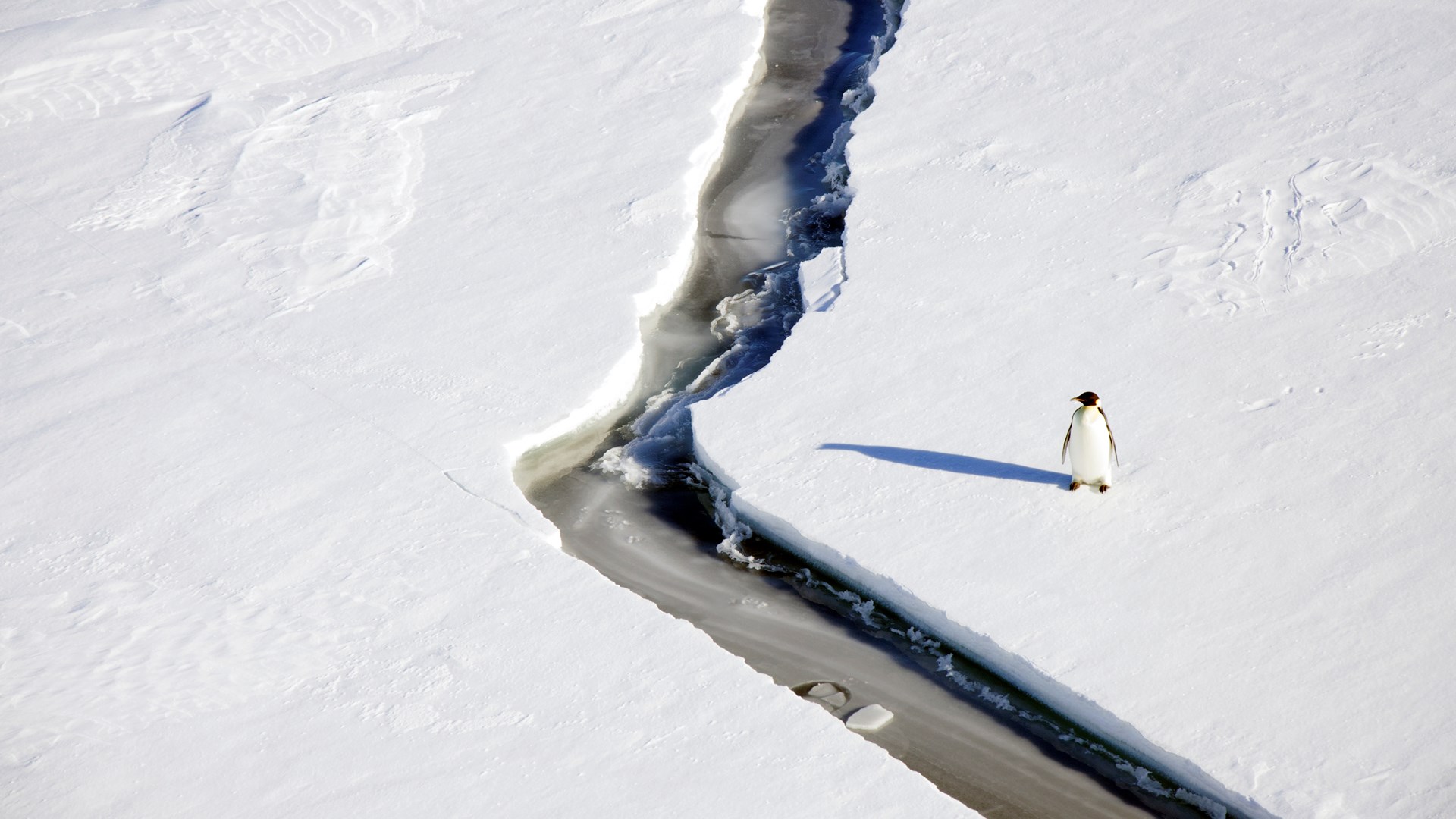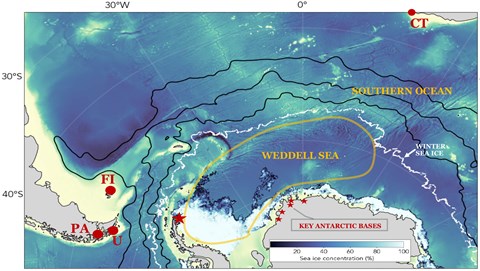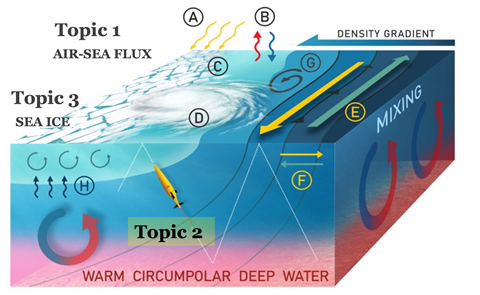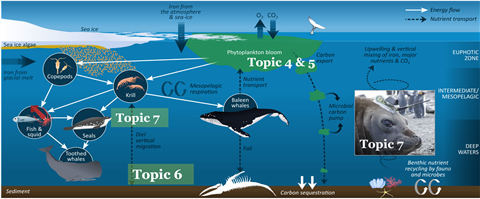Theme: Pulse of the Weddell Sea
 Penguin and Crack, Weddel Sea, photo by Theresa Diener, 2019.
Penguin and Crack, Weddel Sea, photo by Theresa Diener, 2019.
This information is aimed at researchers interested in knowing more about the theme The Pulse of the Weddell Sea: the Weddell Sea's Function and Importance for our Climate and Ecosystems in a Changing World. This is one of two Antarctic themes within the Polar Research Process between 2024 and 2030.
The Theme ‘Pulse of the Weddell Sea’ will aim to address several scientific challenges, recognised as international priorities, to understanding our ocean-climate system, ocean-cryosphere-atmosphere interactions, and their connections to biogeochemical cycling and ecosystems extending from primary producers to the upper trophic levels. Its focus lies in a climate and ecosystem ‘hotspot region’ of the global ocean - the Southern Ocean (SO) with a focus on the Weddell Sea - which has historically been a strategic focus area of Sweden and its presence in polar sciences and influence.
This theme is purposefully designed and unites productive Swedish polar research programs to reveal how the signals from our varying climate are transferred through oceanographic processes, sea ice dynamics, and air-sea fluxes to affect the geochemical cycling of nutrients. This climate-induced pulse leads to specific spatio-temporal patterns of primary production that govern the entire ecosystem, from planktonic organisms to krill, fish and different types of top predators. The different oceanic, sea ice and even atmospheric environments set the basic prerequisites for the life forms that the Weddell Sea can host. The Theme aims to foster interdisciplinary and diverse Swedish-based research that connects internationally renowned collaborators and programs and to optimise the resources required to undertake expensive and time-consuming expeditions to the SO and Antarctica.
The expectations of projects within the Theme will provide some of the first detailed observations of air-sea-ice fluxes and upper ocean dynamics in the SO, particularly in the presence of sea ice.
Scientific Goals within the research theme
- Physical environments: processes that form the physical environment of the Weddell Sea.
- Air-ice-ocean exchange of climate-critical properties
- Ocean circulation with a focus below sea ice edge and the Antarctic shelf
- Sea ice kinematics and dynamics
- Biochemistry and ecosystems biogeochemical cycling in the SO from the upper ocean and sea ice primary production/microbiota interactions to the benthic-pelagic coupling to the upper food web.
- Links between primary producers and the efficiency of the biological pump
- Structure and function of SO microbial food webs
- Benthic fauna and diversity of Antarctic Seas
- Marine mammals of the Weddell Sea
Duration and times
The field seasons for the thematic expeditions are planned to start during the Antarctic summer season 2025/2026 and continue until the Antarctic summer season 2029/2030. Each research theme will be designed to cover one or more field seasons during the specified period.
Theme overview and research topics (T)
The focus of the ‘Pulse of the Weddell Sea’ research theme lies in a climate and ecosystem ‘hotspot region’ of the global ocean – the Southern Ocean (SO) with an emphasis on the Weddell Sea – which has historically been a strategic area of Sweden and its presence in polar sciences and influence. This history is accentuated by the Swedish Antarctic Expedition 1901-1903 and the wrecking of Otto Nordenskjöld’s ship Antarctic.
The theme Pulse of the Weddell Sea is designed to reveal how the signals from our varying climate are transferred through oceanographic processes, sea ice dynamics, and air-sea fluxes to affect the geochemical cycling of nutrients. This climate induced pulse in turn leads to specific spatio-temporal patterns of primary production that govern the entire ecosystem from planktonic organisms to krill, fish and different species of top predators. The different oceanic, sea ice and even atmospheric environments set the basic prerequisites for the life forms that the Weddell Sea can host. If possible, due to available research infrastructure, this theme will also include surveying and documenting the Antarctic wreck site to make it available for research and investigate its possible designation as a protected historic site under the Antarctic Treaty System.
The ‘Pulse of the Weddell Sea’ expeditions will be designed to acquire the field data required to reach the defined scientific goals in the most efficient way. The research theme covers geographic domains of the open ocean, seasonal sea ice covered ocean and possibly to the coastlines of the Antarctic Peninsula (figure 1).

Research Topics
T1. Air-ice-ocean exchange of climate-critical properties
The Southern Ocean’s surface waters absorb vast amounts of atmospheric heat, carbon, momentum and other properties, which subduct to the ocean interior where they are stored at centennial timescales. There is a critical need to enhance the coverage and resolution of observations at the air-ice-ocean interface, particularly in the presence of sea ice.
T2. Ocean circulation with a focus under sea ice and the Antarctic shelf
Large gyre systems are prominent features of the Southern Ocean and the Weddell Gyre is the largest. Here, part of the inflowing/circulating warm, carbon-rich Circumpolar Deep Water (CDW) waters are upwelled and ventilated, and part if transformed to Antarctic Circumpolar Current (AABW) as the continental shelf slope, playing a key-role in mediating the strength of the Meridional Overturning Circulation (MOC) and thus climate. The interaction and dynamics between the Weddell Gyre and Antarctic Slope Front may also control the ingress of CDW onto the continental shelf and under the Filchner-Ronne Ice Shelf - a vital component for understanding past, present and future climate.
T3. Sea ice kinematics and dynamics
The variability of Antarctic sea ice is a crucial component of the local and global climate system. Despite recent increases in extent until 2014, followed by a sharp decline, current earth system models struggle to capture these changes, indicating a lack of understanding of some physical processes. Sea ice kinematics and dynamics are intricately linked to wind, waves, and currents, yet the interplay between these factors remains poorly understood.

T4. Primary producers and the efficiency of the biological pump
The Southern Ocean plays an integral role in modulating and influencing climate by transferring carbon to the deep ocean via its biological pump. However, it is lacking a fundamental understanding of how phytoplankton community composition influences primary production (PP) and the efficiency of carbon export plus sedimentary carbon sequestration, and how these processes are influenced by the physical (Topics 1-3) and chemical conditions.
T5. Structure and function of Southern Ocean microbial food webs
Microorganisms form the basis of marine food webs and are the main drivers of essentially all biogeochemical cycles. Marine microbial communities are largely unculturable and both phylogenetically and functionally diverse. Because of this, the understanding of the factors governing the composition and metabolic processes mediated by microbial communities in the Southern Ocean is incomplete.
T6. Benthic fauna and diversity of Antarctic Seas
Hydrocarbon seeps, hot water vents, and large organic falls, such as shipwrecks or the remains of dead whales, create unique marine ecosystems that harbour species specifically adapted to live on energy-rich ephemeral habitats. Understanding the distribution of these ecosystems is essential to comprehend the vulnerability of species endemic to these habitats. Studies of seeps, vents, and whale-falls in Antarctica are relatively new and still emerging. Also, what are the main pathways of wood degradation in the absence of shipworms at Otto Nordenskjölds shipwreck Antarctic. By studying the pathways of wood degradation, this research could also have practical applications for the preservation of wooden structures and artifacts in marine polar environments (T8).
T7. Marine mammals of the Weddell Sea
The Southern Ocean is inhabited by the world's largest marine mammal populations and four unique, endemic species occur in abundances of millions to tens of millions, the Crabeater Weddell, Leopard and Ross seals. Since they prey on vastly different trophic niches in the Antarctic ecosystem, and thus are affected by fluxes in climate and oceanography (Topic 1, 2, 3) and primary production (Topic 4) in different ways, with different lag phases, they constitute perfect test organisms to investigate how climate variability is reflected in upper trophic levels.
T8. Preserving the heritage of the shipwreck ‘Antarctic’ via digital accessibility
The objectives of this Topic are, by discovering and scanning the shipwreck Antarctic, to secure data of importance to the history of research for many disciplines and countries, and to develop methods for digital accessibility of Antarctic cultural heritage.
In 2020, the remains from Nordenskjöld’s expedition were investigated and digitalized in an Argentine - Swedish research collaboration. Recently, the Argentine Antarctic Institute (IAA) shared data from sonar investigations with University of Gothenburg, providing the position of the shipwreck Antarctic at a depth of 330m.

Timeline
- 9 September 2022
The Swedish Polar Research Secretariat decides on a theme call for Antarctica. - 16 January 2023
The call opens with a focus on multi- and transdisciplinary research with a focus on Antarctica. - 26 September 2023
Decision to approve two theme proposals, PoW and iQ2300. - January–March, 2024
Project call for each research theme. - 21–24 March, 2024
Workshop with researchers in Abisko. - 2025–2026 (preliminary)
First field season in Antarctica.

